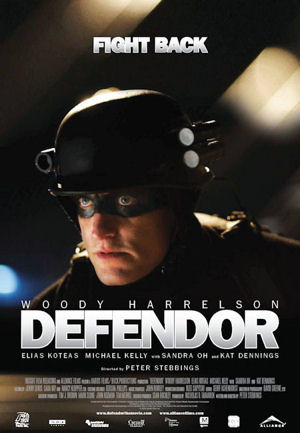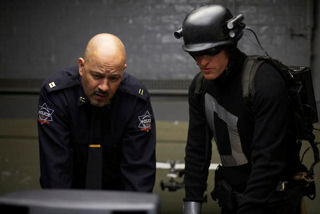|
Defendor
If you walk past the DVD new releases at
your local megamart, you'll see the image of a pugnacious
Woody Harrelson wearing a black mask and helmet. You might
notice the pull quote calling this movie "darkly funny,"
and in some places, perhaps, it is. If that entices you
to pick it up, great, because whether you find it funny
or not, you should find Defendor.
Written and directed by Peter Stebbings,
Defendor is the movie that Kick-Ass claimed
it was going to be. Harrelson stars as Arthur Poppington,
an intellectually challenged man with a strong sense of
morality shaped by comic books. By night he assumes his
alter ego of Defendor, searching for an arch-enemy he calls
"Captain Industry."
As a character study, it would have been
enough, and in that sense it hearkens back to a 70's movie
with a similar set-up called Nunzio. But of course
Arthur happens to be right - and yet wrong - about the corruption
moving through his city, and keeps coming back to tangle
with the same corrupt cop, Chuck Dooney (Elias Koteas, playing
opposite his role as Casey Jones in Teenage Mutant Ninja
Turtles).
In some ways, Defendor borrows from
Taxi Driver, if Travis Bickle had worn a costume
instead of shaved his head. Harrelson has long been an actor
notable for being able to careen from childlike innocence
to extremely dangerous, and Defendor makes full use
of that skill.
However, the hooker Arthur befriends and
defends, played by Kat Dennings, doesn't quite have a heart
of gold, and Arthur barely comprehends what she actually
does for a living. He wants to believe the best of everyone,
pulling standards of behavior out of both comic books and
at one point, The Rockford Files.
Stebbings gets it right, resisting the
urge to give in to feel-good storytelling while still embracing
the resemblances of Arthur's backstory to a typical superhero.
Actually, young Arthur's (Max Dreesen) attention first gets
caught by issues of G.I. Joe, which subtly explains
why Defendor himself seems so paramilitary.
Though
caught up in a typical police corruption story, the consequences
for Arthur seem realistic. The film opens with him undergoing
a psychiatric evaluation, after having been arrested for
smashing up a store and assaulting someone he considered
a villain.
As the
story winds backwards, it's clear that he has guardian angels
of his own, including Police Captain Fairbanks (the excellent
Clark Johnson) who wants to keep Arthur from hurting himself,
realizing too late how deep Arthur really keeps getting.
It is funny, particularly in Arthur's
desire to sound like a real superhero and in the clever
but believable defenses he creates. Stebbings plays with
the audience's growing desire to see Arthur really succeed,
but like Kick-Ass, keeps reminding us that violence
has consequences.
On a small note, Stebbings also creates
believable influences - the comics that influence Arthur
don't really exist (besides G.I. Joe), but Stebbings
seamlessly weaves the character's encyclopedic knowledge
of these fake comics into the narrative.
Defendor turned out to be surprisingly
effective and moving, playing lightly as satire without
ever mis-stepping into parody.
|







